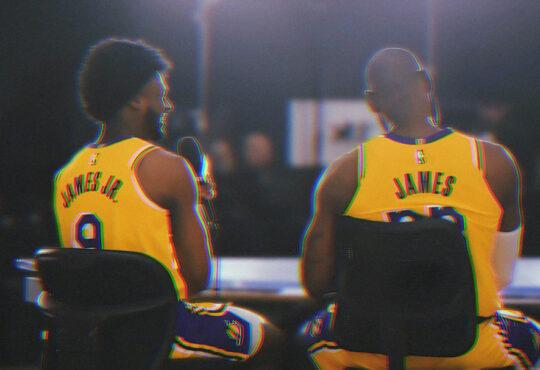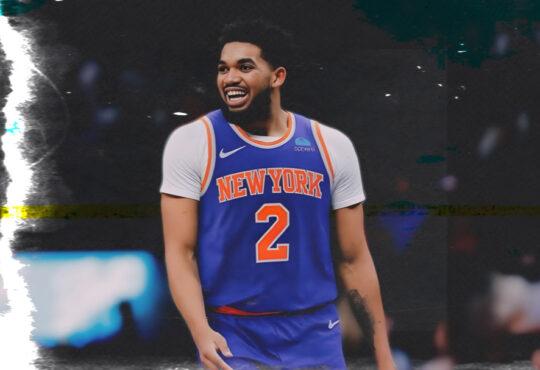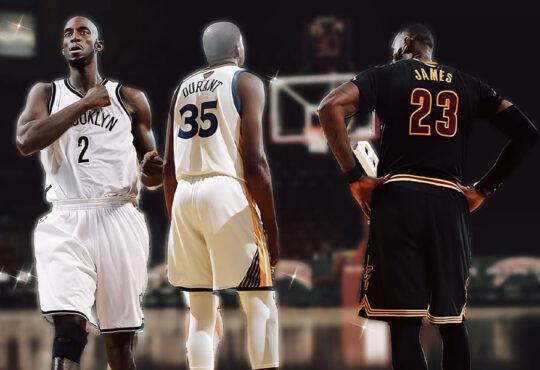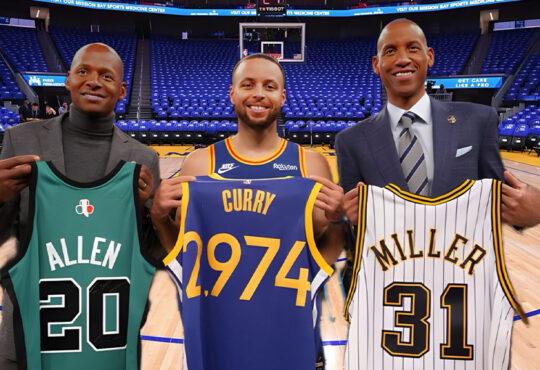
How Is the NBA MVP Decided?
How is the NBA MVP decided? Basketball is a team sport and what matters the most is which team is going to lift the championship trophy at the end of the season. The championship rings make the most difference when we talk about the greatest players of all time.
Anyway, the individual awards are also highly praised within the NBA, the winners get their place in the league’s history and those awards unlock another level when a player needs to sign a new contract.
What is the NBA MVP Award?
The most prestigious individual award in the NBA certainly is the MVP.
The fluid nature of basketball makes quantifying individual value particularly challenging, though analytics like PER, Win Shares, Box Plus/Minus, VORP, and more have provided better metrics for doing so.
The Most Valuable Player Award is an annual award given since the 1955–56 season to the best performing player of the regular season.
The NBA MVP award does not consider the playoff performance for evaluating the winner. So, a player who has been a boomer in the regular season and a bummer later in the postseason can also win it.
The winner receives the Maurice Podoloff Trophy, which is named in honor of the first commissioner, then president, of the NBA, who served from 1946 until 1963.
MVP Voting
The league gives the selected voters the responsibility to rank the five MVP finalists in an order. So, their first choice becomes their most preferred MVP name, the second choice, the lesser preferred, and so on.
The first position carries 10 points, followed by 7 points, 5 points, 3 points, and 1 point for the fifth. The player with the highest cumulative points takes home the coveted trophy.
Until the 1979–80 season, the MVP was selected by a vote of NBA players.
Since the 1980–81 season, the award is decided by a panel of sportswriters and broadcasters throughout the United States and Canada.
Each member of the voting panel casts a vote for first to fifth-place selections. Each first-place vote is worth 10 points; each second-place vote is worth seven; each third-place vote is worth five, fourth-place is worth three, and fifth-place is worth one.
Starting from 2010, one ballot was cast by fans through online voting. The player with the highest point total wins the award.
Starting in 2014, the NBA added transparency by releasing the voting results and media ballots, which some voters theorized has encouraged group-think tendencies. The most recent Collective Bargaining Agreement also included accolade-based qualifications for super-max contracts, which placed immense financial ramifications on voters that can theoretically affect ballots.
In 2017, the NBA took away votes from local broadcasters to combat potential conflicts of interest. In addition to the 100 ballots from the media, a 101st ballot was added in 2010 in the form of an online fan vote.
An unwelcome change in presenting MVP (that has nothing to do with voting) came in 2017 with the introduction of the NBA Awards Show, which postpones the awarding of the trophy until after the Finals. A player receiving the award before a home playoff game was far more hyper than a mildly entertaining TNT show and allowed the winner to appropriately celebrate in front of fans and teammates.
As of the 2020–21 season, the current holder of the award is Nikola Jokić of the Denver Nuggets. Jokić is the second second-round draft pick to win the award, being drafted 41st by Denver in the 2014 NBA draft.
Every player who has won this award and has been eligible for the Naismith Memorial Basketball Hall of Fame has been inducted. Kareem Abdul-Jabbar won the award a record six times. He is also the only player to win the award despite his team not making the playoffs back in the 1975–76 season.
The Importance of winning the award
This may seem incredibly obvious, but voters take great pride in giving the award to somebody on a team that keeps winning. Unfortunately, this isn’t very fair to some superstar players saddled with a horrible roster. Nevertheless, each player knows how important team success is to getting recognition.
Only two players in the history of the league have been able to get the MVP award while suffering through a losing season. The first was Bob Pettit when he played for the St. Louis Hawks with a 33-39 overall record, the first year that the MVP was ever given out. The second was from Kareem Abdul Jabbar in 1975 with the Los Angeles Lakers and their 40-42 record. Other than that, only two other players have won the award with a winning record but without reaching 50 wins.
Players with the most MVP awards
Kareem Abdul-Jabbar – 6 MVP awards
Kareem Abdul-Jabbar is the only team in NBA history to win 6 MVP awards. He did then in the 1970s, three times playing for the Milwaukee Bucks and three times with the Los Angeles Lakers.
Abdul-Jabbar won his first MVP title back in 1971 when he was still using his birth name Lew Alcindor.
Going into the season, the Bucks acquired All-Star guard Oscar Robertson. Milwaukee went on to record the best record in the league with 66 victories including a then-record 20 straight wins.
Alcindor was awarded his first of six NBA Most Valuable Player Awards, along with his first scoring title finishing with an average of 31.7 points per game. He also led the league in total points that season, with 2,596. The Bucks won the NBA title, sweeping the Baltimore Bullets 4–0 in the 1971 NBA Finals.
The following season, Abdul-Jabbar repeated as scoring champion with 34.8 points per game and 2,822 total points. He became the first player to be named the NBA Most Valuable Player twice in his first three years.
Abdul-Jabbar led the Bucks to their fourth consecutive Midwest Division title, and he won his third MVP Award in four years. He was among the top five NBA players in scoring (27.0 ppg, third), rebounding (14.5 RPG, fourth), blocked shots (283, second), and field goal percentage (.539, second).
In the 1975–76 season, his first with the Lakers, Abdul-Jabbar had a dominating season, averaging 27.7 points per game and leading the league in rebounding (16.9), blocked shots (4.12), and total minutes played (3,379). He earned his fourth MVP award, becoming the first winner in Lakers’ franchise history.
The next season, Abdul-Jabbar helped lead the Lakers to the best record (53–29) in the NBA, and he won his fifth MVP award, tying Bill Russell’s record. Abdul-Jabbar led the league in field goal percentage (.579), was third in scoring (26.2), and was second in rebounds (13.3) and blocked shots (3.18).
Magic Johnson joined the Lakers in the 1979-80 season and that was the last time Abdul-Jabbar won the MVP trophy.
Bill Russell – 5 MVP awards
In the 1957-58 season, Russell averaged 16.6 points per game and a league-record average of 22.7 rebounds per game. The NBA reasoned that other centers were better all-round players than Russell but no player was more valuable to his team.
He was voted the NBA Most Valuable Player but only named to the All-NBA Second Team, something that would occur repeatedly throughout his career, as players voted for the MVP award, something that would last until the 1979–80 NBA season, while the media has always voted for the All-NBA teams.
In the 1960–61 NBA season, Russell won his second MVP award averaging 16.9 points and 23.9 rebounds per game, leading his team to a regular-season mark of 57–22. That was the first of three consecutive MVP trophies.
In the 1961 NBA playoffs, the Celtics defeated the Syracuse Nationals 4–1 in the Eastern Division Finals. The Celtics made good use of the fact that the Los Angeles Lakers had exhausted the St. Louis Hawks in a long seven-game Western Conference Finals, and Boston won in five games.
In the 1961–62 NBA season, Russell scored a career-high 18.9 points per game, accompanied by 23.6 rebounds per game. While his rival had a record-breaking season of 50.4 points per game, including Chamberlain’s 100-point game, the Celtics became the first team to win 60 games in a season and Russell was voted as the league’s MVP.
The Celtics lost Bob Cousy to retirement after the 1962–63 NBA season, but they drafted John Havlicek and were powered by Russell, who averaged 16.8 points and 23.6 rebounds per game, won his fourth regular-season MVP award, and earned the NBA All-Star Game MVP honors at the 1963 NBA All-Star Game following his 19-point, 24-rebound performance for the Eastern Conference’s All-Star team.
Skipping one season, Russell was o the MVP level for the last time in the 1964-65 season. The Celtics won a league-record 62 games and Russell averaged 14.1 points and 24.1 rebounds per game, winning his second consecutive rebounding title and his fifth MVP award.
Micheal Jordan – 5 MVP awards
Just like Bill Russell, Michael Jordan won 5 MVP awards.
He got the first one in his fourth season in the league when he led the NBA with 35 points per game on 53% shooting from the field. He was also named the NBA Defensive Player of the Year, as he averaged 1.6 blocks per game and a league-high 3.1 steals per game.
In the 1990–91 season, Jordan won his second MVP award after averaging 31.5 ppg on 53.9% shooting, 6.0 RPG, and 5.5 APG for the regular season. The Bulls finished in first place in their division for the first time in sixteen years and set a franchise record with 61 wins in the regular season. The Bulls advanced to the Finals for the first time in franchise history to face the Los Angeles Lakers a series they won in 5 games finishing the playoffs with a 15-2 record.
Jordan and the Bulls continued their dominance in the 1991–92 season, establishing a 67–15 record, topping their franchise-record from 1990–91.[58] Jordan won his second consecutive MVP award with averages of 30.1 ppg, 6.4 rbg, and 6.1 apg on 52% shooting. The Bulls won their second consecutive title this time beating the Portland Trail Blazers in the finals by 4-2.
After coming back from his first retirement, Jordan led the league in scoring with 30.4 ppg and he won the league’s regular-season and All-Star Game MVP awards. In the playoffs, the Bulls lost only three games in four series as they defeated the Seattle SuperSonics 4–2 in the NBA Finals to win their fourth championship.
Jordan and the Bulls, in his last season with the team, compiled a 62–20 record in the 1997–98 season. Jordan led the league with 28.7 ppg, securing his fifth regular-season MVP award, plus honors for All-NBA First Team, First Defensive Team, and the All-Star Game MVP.
Wilt Chamberlain – 4 MVP awards
In his first NBA season, Chamberlain averaged 37.6 points and 27 rebounds, convincingly breaking the previous regular-season records as a rookie. He needed only 56 games to score 2,102 points, which broke the all-time regular-season scoring record of Bob Pettit, who needed 72 games to score 2,101 points. Chamberlain broke eight NBA records, and he was named NBA Rookie of the Year and NBA MVP that season. Later in his career, Chamberlain won three consecutive MVP trophies from 1966 to 1968.
LeBron James – 4 MVP awards
LeBron James is the only active player among the five with the most MVP awards. He won his first one with the Cleveland Cavaliers in the 2008-09 season when he averaged 28.4 points, 7.6 rebounds, and 7.2 assists per game. That was the first of four MVP trophies in five seasons. The following season he won another one with the Cavs which was followed by Derrick Rose becoming the youngest ever MVP award winner. In 2012 and 2013, now with the Miami Heat, James won his third and fourth MVP awards.





